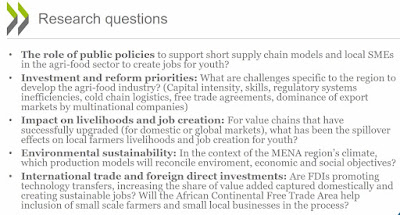29 March 2022. Webinar on Youth employment opportunities in agri-food systems in Middle East and North Africa.
Recording forthcoming.
As part of the OECD project “COVID-19 Response and Recovery of MENA Region”, financed by the Italian Ministry of Foreign Affairs and International Cooperation, the OECD Development Centre is looking at employment challenges faced by youth during the COVID-19 crisis in three countries in the MENA region: Egypt, Morocco and Tunisia.
Like most start-ups, nextProtein began in a garage back in 2014. It was born from the personal and professional ambitions of its founders, who were searching for solutions to change agricultural food production while being able to work and live together. Syrine, an Emergency Operations Specialist at the FAO, and Mohamed, a Grammy-nominated chemical engineer, identified that they could combine organic cycles of nature with the scalable efficiency of technology, to produce an alternative to wasteful and unsustainable agricultural systems.
As part of the OECD project “COVID-19 Response and Recovery of MENA Region”, financed by the Italian Ministry of Foreign Affairs and International Cooperation, the OECD Development Centre is looking at employment challenges faced by youth during the COVID-19 crisis in three countries in the MENA region: Egypt, Morocco and Tunisia.
In particular, it will analyse opportunities for job creation in sectors with high growth potential that remain under-invested, such as the agri-food sector. Indeed, growing populations, urbanisation and rising incomes of the middle class are increasing demand for more diverse, value-added agricultural and food products in Africa.
This rise in food demand can boost job creation along the local agri-food value chains if adequate investments are made to build efficient local food systems. The recent OECD study on Jobs for Rural Youth (2021) estimates that from 2019 to 2030, about 20 million additional jobs are expected to be created in the food economy in 11 sub Saharan African countries analysed.
This rise in food demand can boost job creation along the local agri-food value chains if adequate investments are made to build efficient local food systems. The recent OECD study on Jobs for Rural Youth (2021) estimates that from 2019 to 2030, about 20 million additional jobs are expected to be created in the food economy in 11 sub Saharan African countries analysed.
- Dr. Janet Edeme AUC Commissioner for Agriculture, Rural Development, Blue Economy and Sustainable Environment
- Alexandre Kolev, heads the Social Cohesion Unit at the OECD Development Centre.
- Ji-Yeun RIM, OECD OECD Development Centre
- Larabi Jaidi, Senior Fellow at the Policy Center for the New South, and was a Professor at the University Mohammed V of Rabat - Agdal, Morocco,
- Mohamed Ali Marouani Resident Representative of IRD and CIRAD in Tunisia.
- Syrine CHAALALA nextProtein Tunisia
- Marie-Laure Gibaud, Tech-Dev.
Highlights
nextProtein Tunisia
Founded in 2015 by couple Syrine Chaalala and Mohamed Gastli, nextProtein was launched to help tackle land and resource scarcity using insect protein as feedstock.Tech Dev
Les premiers partenaires "historiques", dont le développement a été soutenu par Tech-Dev sont :
- Ingénierie et Conseils en Développement d’Entreprises (ICDE) au Burkina Faso
- le Bureau d’Appui aux Artisans (BAA) au Bénin
- AGRO-PME Fondation au Cameroun
- le Forum des Jeunes Entreprises du Congo (FJEC) au Congo-Brazzaville ;
- ENDA-Graf Sahel au Sénégal
- le BCGO et le PASYD au Togo
- le CCDE en Côte d’Ivoire
- le CePEPE et SENS BENIN au Bénin
- le Centre du Secteur Privé, au Mali, outil privilégié de l’Association pour la Promotion des Entreprises Privées (APEP)
- la Maison de la Petite Entreprise (MPE) au Tchad
Resource:
Agriculture, Food and Jobs in MENA. OECD
forthcoming 2023
Evidence from ten African countries shows that what youth in these countries value most is job security, such as work in the public sector. Agriculture-related work or medium-skilled jobs in manufacturing are the least attractive for young Africans. Policies can help address the misalignment between youth employment preferences and employment opportunities. A two-pronged approach is recommended: i) helping young people shape career aspirations that are realistic and that can fit with the world they will be entering, and ii) improving the quality of jobs with due regard to the job conditions that matter for young people.





No comments:
Post a Comment